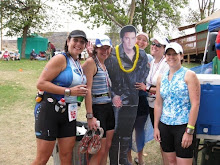At the beginning of every season I look at what I can do in my training to get faster. Add different speedwork in my running, do more hill repeats on my bike, swim more often. And every year I do see minor improvements, but they could be bigger. What I always forget about training is my brain. It’s already hard enough to fit in everything – work, family, workouts. Taking time to just sit there and visualize? Forget it, I can’t even fit in the stretching I’m supposed to do! My form of visualization is when I’m lying in bed the night before a race, having trouble falling asleep because I’ve gone to bed so early, I start thinking about the race the next day. Unfortunately that just causes me a bunch of anxiety, making sleep impossible. So then I try not to think about the race.
This year I am working on my brain. I had read that professional athletes credit visualization as part of the reason for their success, but I was skeptical. How much of a difference could it really make? But at the Seattle Half Marathon last fall, I had an experience that made me realize it was worth looking into. Here’s the long version of the story. I started consistently running in 1999, and that fall I did the Seattle Half in 2:03. I didn’t do it again because of two knee surgeries over the next 5 years. Once those were healed, I started running consistently again in 2006. I did an half marathon in 2007 with a time of 2:25. I did the Seattle Half in 2008 with a time of 2:18. I was not really surprised my times were slower because I was running slow and working on building my running base. Plus I was almost 10 years older! In 2009 I worked with a coach who felt it was time to add speed work back into my running. That was tough! The plan was to do the Seattle Half again. I did some 5K’s and 10K’s leading up to the race, and saw a lot of time improvement in those races compared to the previous years. Knowing those times and what training I had been doing, my coach set my goal time for the half to be under 2 hours. Under two hours? I was incredulous. She has got to be kidding, I thought. No way can I do that – I’ve never run under two hours, and that would be a 15 minute improvement over last year! Impossible. Not only that, I was really tired, my back hurt, blah, blah, blah.
Now you see how I set myself up for failure! I ran the race exactly according to my race plan. Start out slow, build, don’t kill myself on the hills, go all out the last 3 miles. And you know what, I did it in 2:01. To my surprise I beat my 1999 time, a half marathon PR! And as excited as I was about that, I had the nagging thought that I actually could have ran it under 2 hours. Shame on me for not believing in myself. Shame on me for telling myself I could not do it. Allowing negative thoughts to influence me.
Now I am reading and learning about what I can mentally do to train myself. I’m setting time up every day to mentally train. I’m working on relaxing, visualizing, developing positive words and phrases to use when things get difficult in my workouts. And because I am working on this everyday, I’ll be prepared in the days leading up to a big race. I won’t get anxious, I’ll have gone over the course in my head, I’ll have felt the success of crossing the finish line with a great time. I’ll be totally prepared!





















1 comment:
I really like this!
I have also read that it is important to visualize problems that might crop up in a race, and how you'll successfully deal with them. And to be confident that you will give it your best effort ON THAT DAY. For that race to be the best it can be given training, sleep, nutrition, weather, terrain...
Even in a race that isn't going well, I tell myself to not give up, and to have the best "bad" race I possibly can.
The mental training is actually one of my favorite things about triathlon. :)
Post a Comment